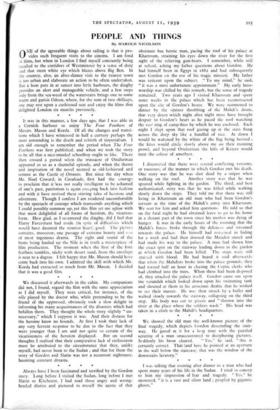It was in this manner, a few days ago, that
I was able in a Cornish harbour to enjoy The Four Feathers of Messrs. Mason and Korda. Of all the changes and transi- tions which I have witnessed in half a century perhaps the most astounding is the death and rebirth of imperialism. I am old enough to remember the period when The Four Feathers was first published, and when we took the story to be all that a nice-minded schoolboy ought to like. There then ensued a period when the massacre of Omdurman appeared to us as a shameful episode, and when the theme and inspiration of the novel seemed as old-fashioned and remote as the Castle of Otranto. But since the day when Mr. Noel Coward, in Cavalcade, first had the courage to proclaim that it 'was not really intelligent to be ashamed of one's past, patriotism is again creeping back into fashion and with it have revived these stirring tales of heroism and adventure. Though I confess I am rendered uncomfortable by the spectacle of courage which transcends anything which I could possibly summon up, yet this film set me aglow with that most delightful of all forms of heroism, the vicarious form. How glad, as I re-entered the dinghy, did I feel that Harry Faversham had made (in spite of difficulties which would have daunted the stoutest heart) good. The picture contains, moreover, one passage of extreme beauty and oqe of most ingenious drama. The sight and sound of the boats being hauled up the Nile is in truth a masterpiece of film production. The moment when the first of the four feathers tumbles, sticky with desert sand, from the envelope is neat to a degree. I felt happy that Mr. Mason should have come back into his own. I admired the skill with which Mr. Korda had extracted so much from Mr. Mason. I decided that it was a good film.
* *








































 Previous page
Previous page